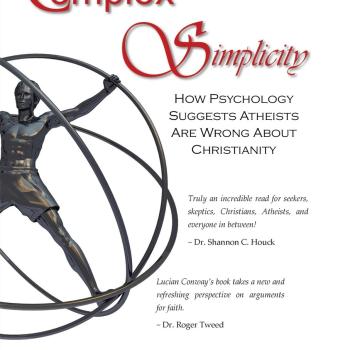Atheism: A Relatively New Phenomenon
The specter of atheism has always hovered at the edge of Western culture to a degree, since prior to the Middle Ages. Even during ancient Biblical times, when every culture the world over was deeply committed to some religion or another, the Psalmist allows for the fact that some people might put forth the proposal that no God exists when he says, “The fool says in his heart, ‘There is no God.’” (Psalm 14:1)
During the Enlightenment, however, atheism saw a very modest rise as the idea that religion was contrary to intellectualism became a growing theme. In the years following the French Revolution, churches became a less influential power in Europe, and universities everywhere began to become more secular and less friendly to religion.
This theme has continued to grow over time, and in the 2000s burst into the public eye in a very overt way with the rise of the New Atheism. Once Atheism became more than just a fringe idea and began to become a viable institution in the West, researchers were robbed of the opportunity to see the effects of Atheism when it is first introduced to a religious person. Now, every person throughout the Western world was aware of atheism, most had encountered an atheist in one form or another, and religious people were becoming ever more familiar with the types of objections raised by atheists. Outside of recruiting young children, a researcher would be hard pressed to find a person unfamiliar with atheism to test early exposure to these ideas.
Recruiting Fresh Eyes
Fortunately for researchers, there are areas of the world wherein modern atheist ideals and arguments are not at all familiar. Some of these places lie on the African continent. While Africa has not always been formally religious, there is an underlying spiritualism which extends throughout the known history of the continent, and most of the African continent ascribes to Christianity or Islam at this time, with a few isolated tribes ascribing to nothing more than a sort of informal animism.
Because of the unfamiliarity these groups have with atheist arguments, this serves as a perfect petri dish for researchers to measure what Atheist arguments would sound like to ears unfamiliar with hearing them. And in 2017, some researchers did just that.
In this study, the researchers selected the country of Kenya, which is 85% Christian, 11% Muslim, a mix of a few other religions, and less than 1% without any religion at all (which is not the same as saying “atheist”).
Recruiting over 300 participants from among the university students, the researchers introduced them, for the first time, to a variety of atheist arguments. Since it is Christians and Christianity most targeted by atheist books, lectures, and debates, the sample only included Christians for examination.
The Arguments
Participants were then exposed to two types of atheist arguments: those which appeal to emotion, and those which appeal to the intellect (i.e. scientific or philosophical arguments). The emotional arguments revolved around the idea that God must be very cruel to allow so much evil and suffering in the world, and also that religion has caused harm to people in a variety of ways. Alternatively, the scientific arguments appealed to the fact that the universe and all the things therein can be explained scientifically such that there is no need of God as an explanation.
How did the Arguments Affect Religiosity?
The researchers discovered that, of the two arguments, it was the emotional rather than the scientific which was most potent in reducing the religiosity of the participant, especially if that participant was a man.
The scientific argument was surprisingly impotent, even among the more educated and intelligent participants. Neither men nor women were particularly discouraged by the science. Part of this may be that the value of scientific thinking is particularly inflated in the Western world, but not so in the Global East. However, arguments can be made from other sources of data that emotional arguments are more effective in general across all populations.
The fact that women seemed more immune to the discouraging effects of the atheist arguments was attributed by the researchers to the fact that women everywhere across the globe tend to be more religious in general than men. Given the stronger appeal of religion to women, it is not entirely surprising that they are less susceptible to attempts to discourage religious belief or practice.
How did the Arguments Affect Wellbeing?
However, the researchers were not just interested in the religiosity of the participants. Another measure which concerned the researchers was the feelings of subjective wellbeing among the participants.
Before they entered the experiment, the researchers measured feelings of wellbeing among these Christian participants. Feelings of wellbeing were relatively high across the board, suggesting that the religious beliefs and practices experienced by these Christians may in some way improve their overall feelings of happiness and fulfillment.
As one might suppose, then, after they had heard all the arguments against Christianity, the reported subjective wellbeing among the men fell to a similar degree as did their religiosity, tied, once again, to the emotional arguments against religion.
It is perhaps not surprising that when a man is told that his religion is a source of harm, that he feels less well-off for being religious.
A Surprising Find
However, the most surprising effect in this study is the following: while women seemed more or less immune to the discouraging effects of both the emotional and scientific messaging, both the men and the women who had seen the scientific arguments against religion actually reported higher subjective wellbeing! Perhaps even more surprising than that is that the women were especially affected by the scientific argument in terms of wellbeing. The researchers could only speculate that giving the participants a better idea of the orderliness of the physical world, along with our better understanding of how it functions, may have given the participants more ease of mind about a universe which might have previously been seen as mysterious.
Social Tolerance
One final thing for which the researchers tested was social tolerance. It is a trope in the Western world that religious people are less tolerant of others, and that to eliminate religion would open a world of limitless tolerance for all groups.
When measuring changes in tolerance following the messages, and especially in those whose religiosity was decreased, tolerance neither improved nor declined. The needle didn’t budge in the area of social tolerance.
What can we Conclude
With only one exception, the findings of this study weren’t particularly surprising. It is an established fact that people are particularly susceptible to appeals to emotion. It is well known that women tend to be more committed to religion than men. It is well understood that religious belief and practice can be tied to feelings of wellbeing (especially in highly religious cultures). The idea that religion is tied to intolerance is a point of some debate. The only finding of surprise was that a more scientific understanding of the world led to more peace of mind, and this is worthy of further investigation in the future.
Reference
(2019) Atheist primes reduce religiosity and subjective wellbeing, Religion, Brain & Behavior, 9:2, 126-142, DOI: 10.1080/2153599X.2018.1436585















